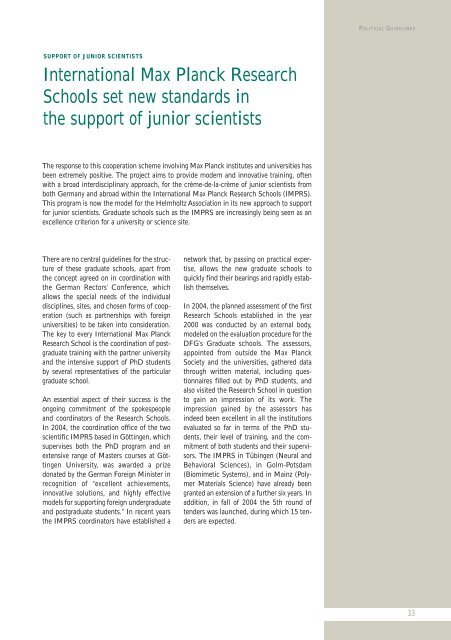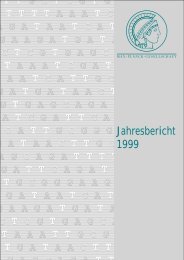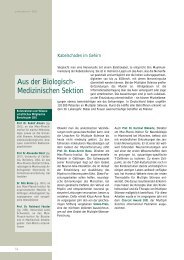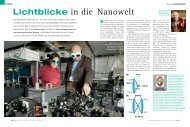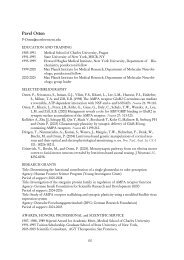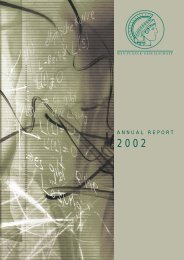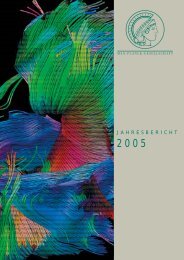Annual Report 2004 - Profil - Max-Planck-Gesellschaft
Annual Report 2004 - Profil - Max-Planck-Gesellschaft
Annual Report 2004 - Profil - Max-Planck-Gesellschaft
Create successful ePaper yourself
Turn your PDF publications into a flip-book with our unique Google optimized e-Paper software.
P OLITICAL G UIDELINESSUPPORT OF JUNIOR SCIENTISTSInternational <strong>Max</strong> <strong>Planck</strong> ResearchSchools set new standards inthe support of junior scientistsThe response to this cooperation scheme involving <strong>Max</strong> <strong>Planck</strong> institutes and universities hasbeen extremely positive. The project aims to provide modern and innovative training, oftenwith a broad interdisciplinary approach, for the crème-de-la-crème of junior scientists fromboth Germany and abroad within the International <strong>Max</strong> <strong>Planck</strong> Research Schools (IMPRS).This program is now the model for the Helmholtz Association in its new approach to supportfor junior scientists. Graduate schools such as the IMPRS are increasingly being seen as anexcellence criterion for a university or science site.There are no central guidelines for the structureof these graduate schools, apart fromthe concept agreed on in coordination withthe German Rectors’ Conference, whichallows the special needs of the individualdisciplines, sites, and chosen forms of cooperation(such as partnerships with foreignuniversities) to be taken into consideration.The key to every International <strong>Max</strong> <strong>Planck</strong>Research School is the coordination of postgraduatetraining with the partner universityand the intensive support of PhD studentsby several representatives of the particulargraduate school.An essential aspect of their success is theongoing commitment of the spokespeopleand coordinators of the Research Schools.In <strong>2004</strong>, the coordination office of the twoscientific IMPRS based in Göttingen, whichsupervises both the PhD program and anextensive range of Masters courses at GöttingenUniversity, was awarded a prizedonated by the German Foreign Minister inrecognition of “excellent achievements,innovative solutions, and highly effectivemodels for supporting foreign undergraduateand postgraduate students.” In recent yearsthe IMPRS coordinators have established anetwork that, by passing on practical expertise,allows the new graduate schools toquickly find their bearings and rapidly establishthemselves.In <strong>2004</strong>, the planned assessment of the firstResearch Schools established in the year2000 was conducted by an external body,modeled on the evaluation procedure for theDFG’s Graduate schools. The assessors,appointed from outside the <strong>Max</strong> <strong>Planck</strong>Society and the universities, gathered datathrough written material, including questionnairesfilled out by PhD students, andalso visited the Research School in questionto gain an impression of its work. Theimpression gained by the assessors hasindeed been excellent in all the institutionsevaluated so far in terms of the PhD students,their level of training, and the commitmentof both students and their supervisors.The IMPRS in Tübingen (Neural andBehavioral Sciences), in Golm-Potsdam(Biomimetic Systems), and in Mainz (PolymerMaterials Science) have already beengranted an extension of a further six years. Inaddition, in fall of <strong>2004</strong> the 5th round oftenders was launched, during which 15 tendersare expected.33


